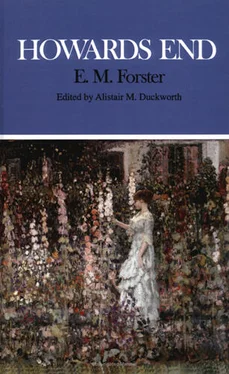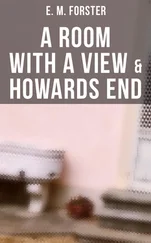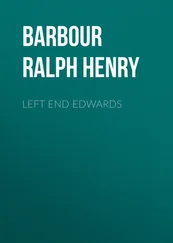Edward Morgan Forster - Howards End
Здесь есть возможность читать онлайн «Edward Morgan Forster - Howards End» весь текст электронной книги совершенно бесплатно (целиком полную версию без сокращений). В некоторых случаях можно слушать аудио, скачать через торрент в формате fb2 и присутствует краткое содержание. Жанр: Классическая проза, на английском языке. Описание произведения, (предисловие) а так же отзывы посетителей доступны на портале библиотеки ЛибКат.
- Название:Howards End
- Автор:
- Жанр:
- Год:неизвестен
- ISBN:нет данных
- Рейтинг книги:3 / 5. Голосов: 1
-
Избранное:Добавить в избранное
- Отзывы:
-
Ваша оценка:
- 60
- 1
- 2
- 3
- 4
- 5
Howards End: краткое содержание, описание и аннотация
Предлагаем к чтению аннотацию, описание, краткое содержание или предисловие (зависит от того, что написал сам автор книги «Howards End»). Если вы не нашли необходимую информацию о книге — напишите в комментариях, мы постараемся отыскать её.
Howards End — читать онлайн бесплатно полную книгу (весь текст) целиком
Ниже представлен текст книги, разбитый по страницам. Система сохранения места последней прочитанной страницы, позволяет с удобством читать онлайн бесплатно книгу «Howards End», без необходимости каждый раз заново искать на чём Вы остановились. Поставьте закладку, и сможете в любой момент перейти на страницу, на которой закончили чтение.
Интервал:
Закладка:
"You were both ill at the time," said Margaret. "I did the obvious things. I had two invalids to nurse. Here was a house, ready furnished and empty. It was obvious. I didn't know myself it would turn into a permanent home. No doubt I have done a little towards straightening the tangle, but things that I can't phrase have helped me."
"I hope it will be permanent," said Helen, drifting away to other thoughts.
"I think so. There are moments when I feel Howards End peculiarly our own."
"All the same, London's creeping."
She pointed over the meadow—over eight or nine meadows, but at the end of them was a red rust.
"You see that in Surrey and even Hampshire now," she continued. "I can see it from the Purbeck Downs. And London is only part of something else, I'm afraid. Life's going to be melted down, all over the world."
Margaret knew that her sister spoke truly. Howards End, Oniton, the Purbeck Downs, the Oderberge, were all survivals, and the melting-pot was being prepared for them. Logically, they had no right to be alive. One's hope was in the weakness of logic. Were they possibly the earth beating time?
"Because a thing is going strong now, it need not go strong for ever," she said. "This craze for motion has only set in during the last hundred years. It may be followed by a civilization that won't be a movement, because it will rest on the earth. All the signs are against it now, but I can't help hoping, and very early in the morning in the garden I feel that our house is the future as well as the past."
They turned and looked at it. Their own memories coloured it now, for Helen's child had been born in the central room of the nine. Then Margaret said, "Oh, take care—!" for something moved behind the window of the hall, and the door opened.
"The conclave's breaking at last. I'll go."
It was Paul.
Helen retreated with the children far into the field. Friendly voices greeted her. Margaret rose, to encounter a man with a heavy black moustache.
"My father has asked for you," he said with hostility. She took her work and followed him.
"We have been talking business," he continued, "but I dare say you knew all about it beforehand."
"Yes, I did."
Clumsy of movement—for he had spent all his life in the saddle—Paul drove his foot against the paint of the front door. Mrs. Wilcox gave a little cry of annoyance. She did not like anything scratched; she stopped in the hall to take Dolly's boa and gloves out of a vase.
Her husband was lying in a great leather chair in the dining-room, and by his side, holding his hand rather ostentatiously, was Evie. Dolly, dressed in purple, sat near the window. The room was a little dark and airless; they were obliged to keep it like this until the carting of the hay. Margaret joined the family without speaking; the five of them had met already at tea, and she knew quite well what was going to be said. Averse to wasting her time, she went on sewing. The clock struck six.
"Is this going to suit every one?" said Henry in a weary voice. He used the old phrases, but their effect was unexpected and shadowy. "Because I don't want you all coming here later on and complaining that I have been unfair."
"It's apparently got to suit us," said Paul.
"I beg your pardon, my boy. You have only to speak, and I will leave the house to you instead."
Paul frowned ill-temperedly, and began scratching at his arm. "As I've given up the outdoor life that suited me, and I have come home to look after the business, it's no good my settling down here," he said at last. "It's not really the country, and it's not the town."
"Very well. Does my arrangement suit you, Evie?"
"Of course, Father."
"And you, Dolly?"
Dolly raised her faded little face, which sorrow could wither but not steady. "Perfectly splendidly," she said. "I thought Charles wanted it for the boys, but last time I saw him he said no, because we cannot possibly live in this part of England again. Charles says we ought to change our name, but I cannot think what to, for Wilcox just suits Charles and me, and I can't think of any other name."
There was a general silence. Dolly looked nervously round, fearing that she had been inappropriate. Paul continued to scratch his arm.
"Then I leave Howards End to my wife absolutely," said Henry. "And let every one understand that; and after I am dead let there be no jealousy and no surprise."
Margaret did not answer. There was something uncanny in her triumph. She, who had never expected to conquer anyone, had charged straight through these Wilcoxes and broken up their lives.
"In consequence, I leave my wife no money," said Henry. "That is her own wish. All that she would have had will be divided among you. I am also giving you a great deal in my lifetime, so that you may be independent of me. That is her wish, too. She also is giving away a great deal of money. She intends to diminish her income by half during the next ten years; she intends when she dies to leave the house to her—to her nephew, down in the field. Is all that clear? Does every one understand?"
Paul rose to his feet. He was accustomed to natives, and a very little shook him out of the Englishman. Feeling manly and cynical, he said: "Down in the field? Oh, come! I think we might have had the whole establishment, piccaninnies included."
Mrs. Cahill whispered: "Don't, Paul. You promised you'd take care." Feeling a woman of the world, she rose and prepared to take her leave.
Her father kissed her. "Good-bye, old girl," he said; "don't you worry about me. "
"Good-bye, Dad."
Then it was Dolly's turn. Anxious to contribute, she laughed nervously, and said: "Good-bye, Mr. Wilcox. It does seem curious that Mrs. Wilcox should have left Margaret Howards End, and yet she get it, after all."
From Evie came a sharply-drawn breath. "Good-bye," she said to Margaret, and kissed her.
And again and again fell the word, like the ebb of a dying sea.
"Good-bye."
"Good-bye, Dolly."
"So long, Father."
"Good-bye, my boy; always take care of yourself."
"Good-bye, Mrs. Wilcox."
"Good-bye.
Margaret saw their visitors to the gate. Then she returned to her husband and laid her head in his hands. He was pitiably tired. But Dolly's remark had interested her. At last she said: "Could you tell me, Henry, what was that about Mrs. Wilcox having left me Howards End?"
Tranquilly he replied: "Yes, she did. But that is a very old story. When she was ill and you were so kind to her she wanted to make you some return, and, not being herself at the time, scribbled 'Howards End' on a piece of paper. I went into it thoroughly, and, as it was clearly fanciful, I set it aside, little knowing what my Margaret would be to me in the future."
Margaret was silent. Something shook her life in its inmost recesses, and she shivered.
"I didn't do wrong, did I?" he asked, bending down.
"You didn't, darling. Nothing has been done wrong."
From the garden came laughter. "Here they are at last!" exclaimed Henry, disengaging himself with a smile. Helen rushed into the gloom, holding Tom by one hand and carrying her baby on the other. There were shouts of infectious joy.
"The field's cut!" Helen cried excitedly—"the big meadow! We've seen to the very end, and it'll be such a crop of hay as never!"
Weybridge, 1908-1910.
Интервал:
Закладка:
Похожие книги на «Howards End»
Представляем Вашему вниманию похожие книги на «Howards End» списком для выбора. Мы отобрали схожую по названию и смыслу литературу в надежде предоставить читателям больше вариантов отыскать новые, интересные, ещё непрочитанные произведения.
Обсуждение, отзывы о книге «Howards End» и просто собственные мнения читателей. Оставьте ваши комментарии, напишите, что Вы думаете о произведении, его смысле или главных героях. Укажите что конкретно понравилось, а что нет, и почему Вы так считаете.












